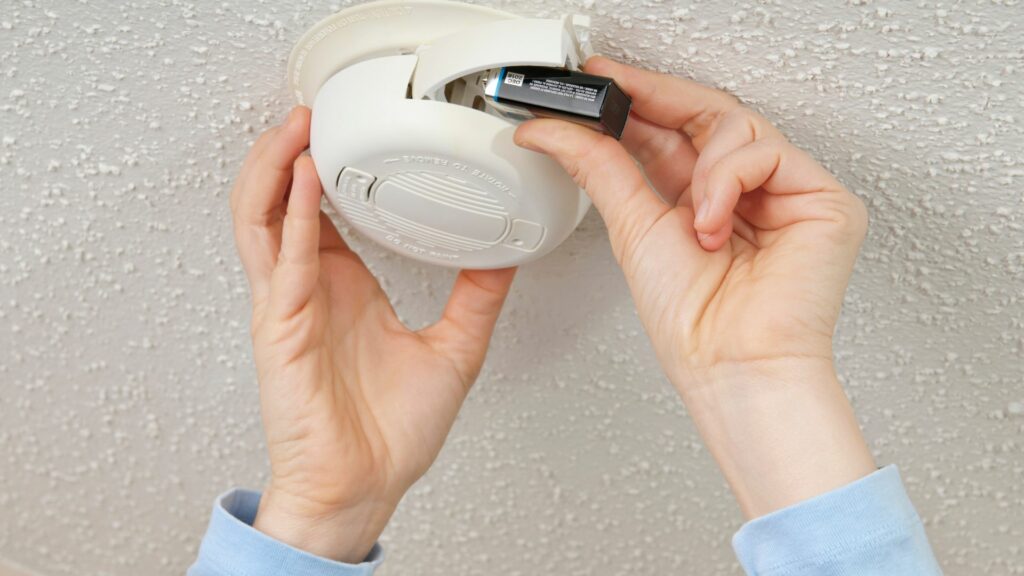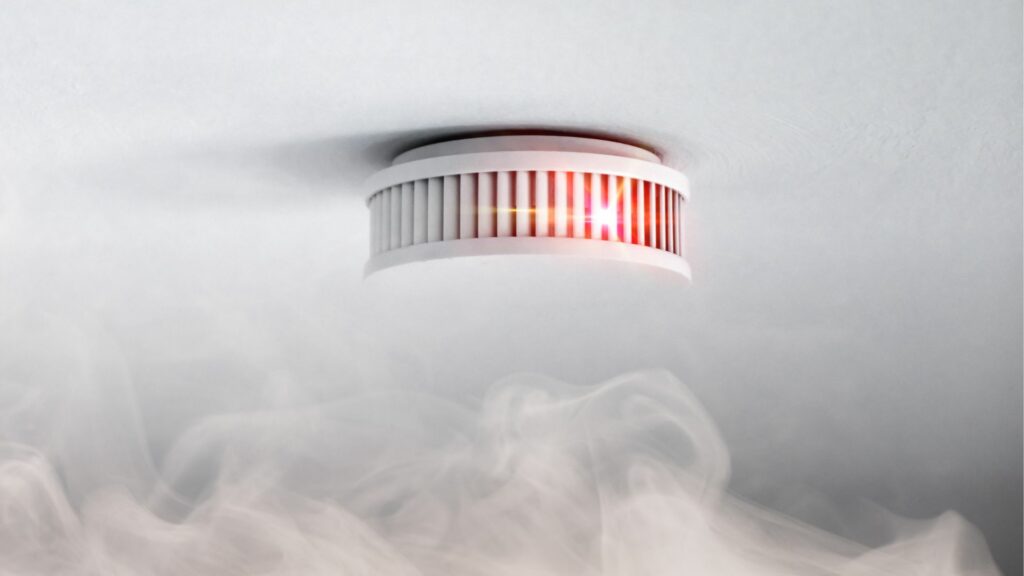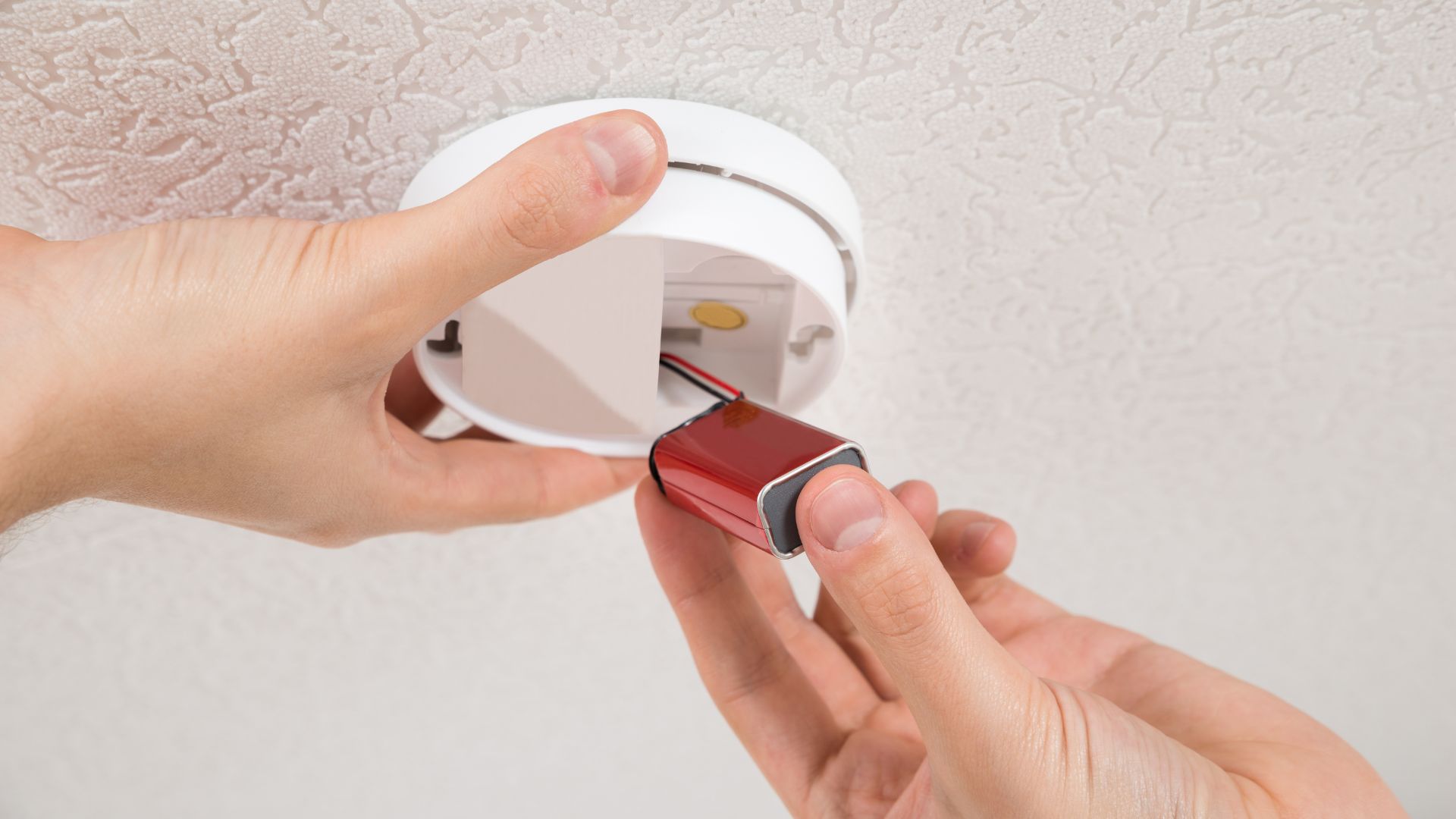This behavior sounds abnormal, but it is more common than you think. Smoke detectors can beep for a variety of reasons. But if yours is beeping even though you removed the batteries, you can blame the following:
1). Look For Other Smoke Detectors
The National Fire Protection Association expects consumers to install smoke alarms in multiple rooms. Some consumers want to save money by using one smoke alarm. But what happens when an alarm in the kitchen on the first floor goes off while you’re in the attic?
Realistically, you cannot expect to hear the beeping. This is why multiple smoke alarms are so important. You should also interlink them. This allows the noise to reach you by making sure that beeping in one smoke detector triggers all the other alarms in the house.
But that presents a slight challenge. Removing the batteries from one smoke detector won’t stop the other alarms from beeping if they detect smoke. You may blame the beeping on the detector that has no batteries when the sound actually originates from another smoke detector in the vicinity.
Inspect all the smoke alarms in your house to identify the source of the sound.
2). Inspect the Carbon Monoxide And Heat Detectors
According to the National Conference of State Legislatures, carbon monoxide poisoning sends ten thousand or more people to the hospital each year. Of those patients, more than four hundred die.
Therefore, many states require residential and commercial buildings to install carbon monoxide detectors. The beeping you hear may actually originate from the carbon monoxide alarms in the vicinity.
Once again, confirm your suspicions by inspecting the carbon monoxide alarms. If you get close enough, you will know whether the devices in question are beeping or silent.
3). The Smoke Alarm Is Hardwired
Incessant chirping is normal. You hear the sound when the battery is low. People expect the noise to stop when they remove the battery. However, that only applies to battery-powered smoke alarms.
Battery-powered devices rely solely on batteries to meet their electrical needs. Hardwired smoke detectors use your home’s circuit. However, manufacturers include batteries that provide backup power during a blackout.
When those backup batteries are almost depleted, the hardwired smoke detector will chirp. Removing the batteries won’t silence the smoke detector because it still has a power source (Your home’s circuit).
What if you change the battery, but the beeping continues? You can blame a microprocessor error that refuses to clear even after inserting new batteries.
4). The Smoke Detector Has A Residual Charge
Removing the battery will deprive the smoke detector of power. However, it still has a residual charge that allows the device to continue chirping in response to a low battery charge or no battery.
It should be noted that you can’t remove the batteries in lithium-ion battery-powered smoke alarms. Removing the alarm from the base disconnects the device. However, it can also store a residual charge that allows the device to continue chirping.
If you’ve owned your smoke detector for ten or more years, don’t bother troubleshooting it. The device has reached the end of its lifespan. Throw it away and get a replacement.
Will Smoke Detector Stop Beeping Without Battery?

The beeping sound is supposed to stop once you remove the battery. But it won’t stop immediately. Expect a bit of a delay. If the beeping continues for longer than expected, the device has a defect.
However, even with a defect, the smoke detector will eventually stop once you remove the battery. Smoke alarms are electronic devices. They need a power source to operate. At some point, the residual energy will run out, and the smoke detector will fall silent.
How Long Will A Smoke Detector Beep Without A Battery?
The experts at Safe Lincs expect a smoke detector with a residual charge to beep for a minute before falling silent. The test button will expedite this process.
How To Stop Smoke Detector From Chirping Without Battery?
A smoke alarm’s continuous chirping is irritating. Fortunately, you have ways of killing the noise:
1). Check Smoke/CO In Your Home

If the chirping is coming from the other smoke detectors and carbon monoxide alarms, find the source of the sound and figure out why it keeps beeping. If the carbon monoxide alarm is chirping, maybe you have dangerous CO levels in your home.
If the other smoke alarms are chipping, maybe they’ve detected smoke. Because smoke detectors chirp when the battery runs out of charge, perhaps the batteries in multiple smoke alarms are depleted.
Find the beeping smoke alarm or carbon monoxide detector and eliminate the factors causing the device to chirp.
2). Replace The Smoke Alarm With Lithium-ion Batteries
Smoke detectors with lithium-ion batteries are tricky because they are sealed. You can’t remove the batteries. When a lithium-ion-powered smoke alarm chirps because of a low battery charge, you must replace the entire smoke alarm. Otherwise, the noise will persist until the battery runs dry.
3). Replace Old Smoke Detectors
Lithium-ion smoke detectors are not the only devices you should replace every ten years. According to All-State, most smoke alarms have a lifespan of ten years. Therefore, if you bought a chirping smoke alarm ten or more years ago, don’t waste time on repairs or even new batteries.
Replace the smoke alarm. Some smoke alarms generate a certain number of beeps when they reach the end of their life. Check the manual to determine whether the chirping you hear matches the number of beeps a smoke detector produces at the end of its life.
4). Eliminate The Residual Charge
Pressing and holding the test button for ten or more seconds will eliminate the residual charge that allows a smoke detector without a battery to chirp. This approach is particularly beneficial for smoke detectors with lithium-ion batteries.
Because they are sealed, you don’t have the option of removing and re-inserting the batteries. The only way to silence them is to discharge the circuitry. You take this step after removing the smoke detector from the base.
5). Insert New Batteries
This is the simplest option. If the smoke detector started chirping because of a low battery charge, and it kept chirping after you took out the batteries, insert new batteries. This will solve the problem.
The chirping may persist because of errors in the microprocessor. But resetting the device will clear them. If the chirping is still present after performing a reset, test the batteries. Maybe you bought a defective set or confused depleted batteries for their fresh counterparts.
If the chirping won’t stop despite inserting a fresh set of batteries, get a new smoke detector. The old one is dead or defective. You can try fixing the device, but even if you succeed, you won’t trust the alarm to do its work. You are better off getting a new one.
6). Flip The Circuit Breaker To The Off Position
Even if a battery-powered smoke detector has a residual charge in its circuitry, that charge will eventually dissipate, and the smoke detector will go silent. You can’t say the same for hardwired devices because they get their power from the circuit.
Besides replacing depleted batteries, you can silence hardwired smoke alarms by flipping their circuit breakers to the off position. This will deprive the alarms of power by de-energizing the circuit.

